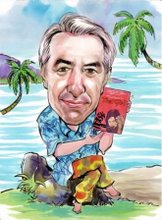


If you ask anyone from anywhere in the world what they most associate with Bangkok, they’ll probably say torrid women, temples and traffic jams. What a terrific reputation that is for a city to have!
I profess no knowledge of the first, but I do know that when I came here with my wife in the seventies the Bangkok traffic was horrendous. I remember one long stop-over on our way to Hong Kong when we decided to spend the day in the city centre. By the time the taxi had got us to the Grand Palace, there was about half an hour before we had to head back to the airport.
Would you believe it, a lot has been achieved since then and things are not nearly as bad as they were then. There’s plenty of ladies in Bangkok still but today the traffic sometimes actually moves and it’s not always total gridlock.
The traffic police deserve some of the credit for this achievement. Their suicide squads are always out there in the middle of the road facing the heat and fumes in their tight uniforms, waving their arms around to some effect. And at major intersections they manually operate the lights, stopping the traffic only after long intervals, thus maximizing the flow quite effectively.
I like the digital countdown displays too that are at big junctions telling you how long you’ll have to wait, thus alerting drivers to move off quickly when the lights change. The idea of having extra lanes going into town in the morning rush hour and only one coming out and vice versa in the evening also seems to work pretty well.
There’s plenty of new infrastructure since the seventies. The many expressways and overhead flyovers, sometimes creating eight lane highways, are quite phenomenal, and the new mass rapid transits are first rate. I love the Skytrain which whisks me silently above the toiling traffic on Sukhumvit road and the new underground railway is as slick and glossy as any in the world. It would now be chaos and the city intolerable without them!
Out towards the airport the stark gantries of a never to be completed rail link, a joint venture with Hopewell Holdings of Hong Kong, that fell victim to the ‘Asian crisis’ and currency collapse of 1997 stand witness to the fragility of progress in Bangkok. The political turmoil and coup of 2006 also threatened the new transport mega-projects that the former Thaksin regime hoped would power the economy through its second electoral term. Nonetheless the interim government has approved a number of these, so things have not totally ground to a halt.
One interesting new scheme, a plan that long ago was proposed by an Australian project manager but rejected at that time, is the so-called BRT or Bus Rapid Transit. Air conditioned buses will run on ‘dedicated lanes’, some of them newly constructed on overhead lanes at points of congestion. The buses are like a Skytrain but come down to earth in places where traffic flow permits, offering considerable flexibility at a much reduced cost.
Sadly it is reported (Bangkok Post, 12 November 2007) that of the eighteen companies expressing an interest in supplying 45 new buses for the scheme, not a single one in the event submitted a tender. Bangkok’s deputy governor expressed surprise at the lack of response, saying that perhaps the bidding terms were too strict or ‘someone does not want the project to succeed’.
While the BRT is much cheaper per mile than both the underground and the Skytrain which is currently being extended, all these mega-projects absorb vast sums of public money. The crux is that Bangkok is constantly growing and however much money is thrown at the problem, it will only get worse and worse. There may be traffic jams now but tomorrow it could be apocalyptic and the city near paralysis.
What is needed is some lateral thinking and an attempt to curb the monstrous growth of this unruly city. Could they not spend a little money on decentralizing government offices to the provinces? A policy of regional development offering incentives to setting up factories in provincial centres, would also relieve the pressure on Bangkok and help solve the problem of urban drift and migration from the countryside. Fundamental changes are surely essential even though inevitably such policies are only ever partially successful.
Then again one thinks of the need for traffic management schemes such as in Singapore and in London. Allowing citizens to drive alone into dense urban areas in a large metallic capsule of a ton or more is sheer madness. Driving into the Central Business District in Singapore incurs a charge unless there is more than one person in the car. On top of this, they long ago discouraged car ownership with penal taxation of new cars and tough incentives to scrap or export cars when they reach ten years.
London’s mayor, Ken Livingstone has more recently required all cars to pay a ‘congestion charge’ to drive into the city centre and while not solving all traffic problems at a stroke, this has generally been regarded as a success. It certainly took a lot of political courage and strength.
Bangkok needs something of the same though the odds are always against. It’s all about politics as the disruption caused by such changes is unpopular and loses votes. Anyway, the Thais are tolerant and can accept life’s traffic jam. Mai pen rai! It doesn’t really matter that much if you spend several hours a day steaming in a traffic jam if there’s nothing whatsoever you can do about it.
I can now think of some slightly bizarre lateral solutions to traffic problems that would be less intrusive than traffic exclusion schemes. For example, if there are traffic jams, perhaps it’s because there are too many unnecessary journeys.
The worst traffic I’ve ever encountered was in Lagos, the capital of Nigeria. They tried banning cars with odd or even registration numbers on alternate days which didn’t work very well, though it gave a lot of new business to the shops that printed number plates.
It was argued persuasively that the problem could be alleviated most quickly by improving the appalling telephone system. If people could actually speak to each other on the phone then they wouldn’t have to make that journey.
There was also a universal culture in Nigeria, peculiar to what we euphemistically call a developing country, that business, official and otherwise, can only be done if the supplicant goes and presents himself to the man in power to ask for his patronage and favours. Unless you actually go and grovel in person, nothing will ever get done.
To me Thailand doesn’t seem much further advanced in this respect which is dreadfully inefficient in every way, particularly as it generates road traffic. If there were a culture that it was normal to reply to letters and emails and if officials and businesses could be relied upon to deal promptly with correspondance, then millions of journeys would be saved.
The bureaucracy should also review its many regulatory procedures and requirements and cut them down to the essential minimum. For example, for me as a foreigner to get married in Thailand, I had to produce a duly annointed ‘Affirmation of Freedom to Marry’, an unverified statement that I was not already married. Obtaining this piece of paper required me to make no fewer than twelve journeys to various offices in Bangkok, thus adding to the traffic jams and providing absolutely no assurance that I was not a dastardly bigamist.
Cutting red tape, streamlining regulations and official procedures, conducting more business by email and mail and the use of video-conferencing and home working where a computer is the essential tool would hugely add to efficiency and free up the roads a percentage or two. It would certainly be much cheaper than digging more undergrounds.
The present mid-century culture of business and bureaucracy in Bangkok maximizes journeys to the benefit only of the taxis, though their drivers have my admiration for surviving the traffic jams, in most cases, with such good humour.
How tough it must be to pay for fuel and the rent for the taxi and then to make a little on top, much of the time facing impenetrable traffic jams. Though of course nobody is exempt from this creeping urban sclerosis. The buses rattle by, old and smoky, the passengers standing shoulder to shoulder, the lucky ones sitting slumped forward, exhausted after a day’s work. That’s just the way Bangkok has always been.
For the poor Bangkokian, traffic jams are a torment that must push the hard working wage slave almost beyond endurance, yet somehow Bangkok people keep smiling. Somehow they seem to accept with good humour conditions that elsewhere would be regarded as being beyond the bounds of human tolerance.





1 comment:
hi, i'm just surprised, how Bangkok's reality you depicted is dramatically like here in Moscow, Russia. looks like that's a common problem of many underdeveloped countries capitals...
Post a Comment